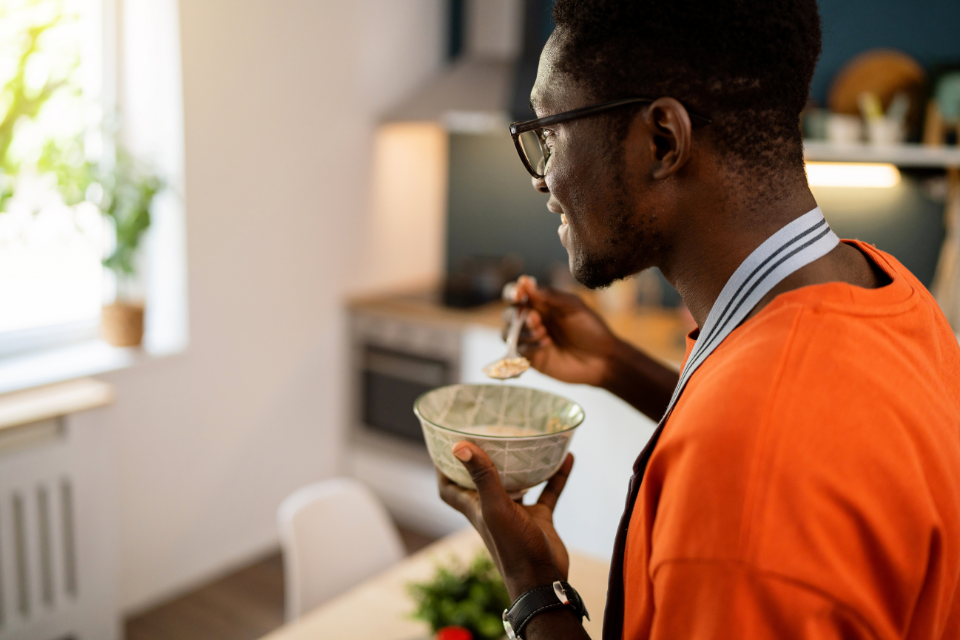Oatmeal is not only delicious, but also an easily digestible food. Oatmeal is a type of cereal made out of oats. It is easy to make and is great as a quick snack or nutritious breakfast.
Instant oatmeal can be made by simply adding your choice of base (like water or milk) to a bowl of oats and microwaving on high for 2 minutes. Stovetop oatmeal can be made by bringing your choice of base to a boil, adding your oats, and then cooking for about 5 minutes until thickened.
However, many patients may wonder if it is okay to eat oatmeal with pancreatitis or other conditions of the pancreas. Pancreatitis is the inflammation of the pancreas, an organ located in the abdomen. It regulates blood sugar levels and produces important enzymes that allow the body to digest nutrients from food. Pancreatitis patients may suffer from digestive issues, including experiencing pain while eating or drinking, flare-ups, and type 3c diabetes. These conditions can make it hard for pancreatitis patients to consume certain types of food and get necessary nutrients. It is recommended that pancreatitis eat a low-fat, high-protein diet. The recommended daily fat intake for pancreatitis patients is typically between 30 and 50 grams per day in the U.S., with different recommendations from country to country.
As long as you take care when picking your ingredients, oatmeal can be a low-fat, pancreatitis-friendly option! In this blog post guided by Dr. Sinead Duggan, an expert in nutrition and pancreatic disease at Trinity College Dublin, we will explore the relationship between pancreatitis and oatmeal.
Learn more about the pancreas.
Can I eat oatmeal with pancreatitis?
Yes, many pancreatitis patients can eat oatmeal without digestive issues. However, oatmeal may not be right for everyone. Instant oatmeal can be heavily processed and high in sugar. Oatmeal that is high in sugar may not be suitable for people with pancreatitis-related complications, like type 3c diabetes.
If you have pancreatitis-related complications, you may have different sugar needs. Oatmeal does not generally contain gluten, but if you are sensitive to gluten you should look for oatmeal labeled gluten-free. If you have recently experienced a pancreatitis flare-up, your doctor may recommend a specific diet.
It is always important to be aware of your doctor’s recommendations, a food’s fat content, and your own dietary needs. Always make sure to read the nutritional labels before buying. In addition, oatmeal is low in protein, so be sure that you get protein from another source! Try adding a protein powder to your oatmeal. This can help give your body an extra boost of nutrients!
Always consult your doctor before making dietary changes.
Is oatmeal good for pancreatitis?
Oatmeal is packed with carbohydrates, antioxidants, and Vitamin B1 making it a quick and nutritious meal for people with pancreatitis. It also contains fiber, making the body feel fuller for a longer period of time and helps maintain good gut function. Eating oatmeal has been shown to lower cholesterol and can also help keep blood sugar levels from spiking after eating, making it a good source of carbohydrates for those with diabetes.
A recent article from 2019 discussed the role of fiber in pancreatic diseases. While it is still highly debated whether fiber is good or bad for the pancreas, the study found that there was not enough data from human trials to decisively conclude one way or the other. The study encouraged each patient to consider their own needs and conditions before concluding if fiber was right for them.
Learn more about nutrition for pancreatitis.
Tips for Eating Oatmeal with Pancreatitis
Pancreatitis can sometimes make it difficult to enjoy the foods we love. It can be especially hard to stick to the recommended low-fat, high-protein diet. A diet that is not right for your body may cause pancreatitis pain and sometimes trigger flare-ups. By using these tips, you can make the “bland” diet of oatmeal a treat to look forward to in the morning!
Make with Water or Low-Fat/No-Fat Milk
Regular milk can be high in fat and may be difficult for the pancreas to digest. Instead, consider using water or low-fat milk as the base for your oatmeal. Some suitable vegan options include almond, rice, or oat milk.
Top with Pancreatitis-Friendly Fruits
Top your oatmeal with some fresh apple slices or banana chunks. Fruits contain natural sugars that can cause less of a spike in blood sugar levels than cane sugar. They can be a great sweet treat, especially for those with type 3c diabetes!
Mix in Protein Powder
Try mixing in low-fat protein powder for an extra boost of energy! Experiment with different protein powder flavors, like peanut butter or chocolate.
Check Fat Content
Fat content varies depending on the type and brand of oatmeal. Instant oatmeal can be high in fat and sugar, so be sure to check the labels. Look for key phrases, like “low-fat,” “non-fat,” and “low sugar.”
Check Sugar Content
Pancreatitis patients may also deal with diabetes. Always make sure the sugar content of your meal is okay for your needs. If craving a sweeter taste, you may try substituting with alternative sweeteners.
Key Takeaways
- Oatmeal can be a good meal option for pancreatitis patients. It is rich in nutrients like antioxidants, fiber, and vitamin B12.
- Oatmeal should not be used as a substitute for a full meal. It is very low in protein and does not contain other essential vitamins, like Vitamins A, D, E, and K, which are recommended for pancreatitis patients.
- Try adding toppings to your oatmeal. Avoid high-fat, high-sugar toppings like cream and brown sugar. Instead, opt for toppings like fresh fruit, honey, and protein powder which contain lots of valuable nutrients and will add lots of flavor to your oatmeal.
- Always consult your doctor about what is right for you.

